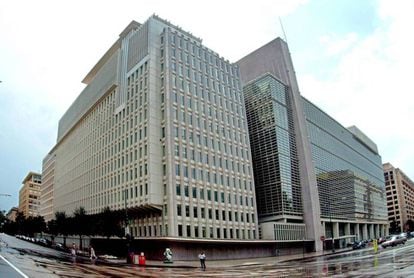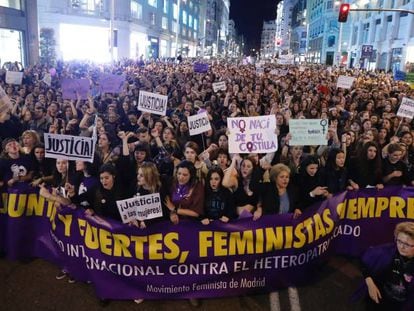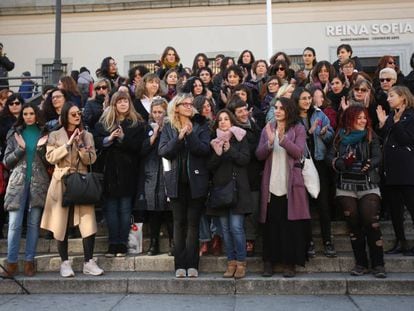One in four female workers at World Bank has felt sexually harassed, poll shows
Internal survey seen by EL PAÍS reflects that few women are reporting cases; international lender admits that more needs to be done

The debate over the #MeToo movement has reached the World Bank. The international lender has carried out an internal survey about sexual harassment in the workplace that has not been publicly released but which EL PAÍS has had access to. The results show that 25% of participating women and 4% of men said they have been victims.
Of the approximately 24,000 people who work at the World Bank Group on permanent and temporary contracts, less than a fourth (5,056) took the survey, which was e-mailed to employees in March. Among the people who said they experienced harassment, only 12% decided to report it (this figure rises to 14% among women), and most of the individuals who did so said they were unhappy with the consequences of speaking out.
We will not tolerate transgressions that jeopardize our vital mission of ending poverty and creating opportunities for millions around the world
World Bank President Jim Yong Kim
Around 57% of respondents were women, 40% were men, and a further three percent declined to specify their gender. Two thirds of staffers work at the international organization’s headquarters in Washington DC, and there were more cases of abuse there than in the World Bank’s offices in other countries.
The poll defined harassment as “unwelcome sexual advance, request for sexual favor” or any other acts of a sexual nature that interfere with the job or create an intimidatory atmosphere.
The survey, while incomplete, provides insights into the scope of this problem. The results were released internally in May, and they reveal how many workers are afraid to report abuse. Of those who did not go public with it, 32% said they were afraid of the consequences, while 27% said they didn’t think anything would change, and a further 23% said they didn’t trust the system.
Among those who did complain, 50% said they were not satisfied with the response, compared to 38% who were. And 18% of those who complained suffered retaliation.
We have to hold ourselves to very high standards and practice what we preach
Daniel Sellen, chair World Bank Staff Association
Around 6% of respondents said they had been harassed three or more times in the last three years, while 4% reported that they felt at risk and were considering quitting their jobs. Additionally, 10% of men and 11% of women said they had witnessed sexual abuse being committed against other workers.
In search of a safe space
“The World Bank Group strongly believes all our staff deserve to work in a safe environment, free from any form of harassment. The World Bank Group has long taken the issue of sexual harassment seriously, and we have a robust system in place to address these matters. However, like many large organizations, we know we can always improve, and we are committed to doing so,” said a spokesman in an e-mail.
Daniel Sellen, chair of the World Bank’s Staff Association – which defends the rights of staff workers – says that the organization has a moral duty to deal with sexual harassment after having criticized its prevalence in certain countries. “We have to hold ourselves to very high standards and practice what we preach,” he said in an interview.
Top officials at the World Bank have announced measures against sexual harassment in recent months. Some of these measures include hiring a consulting firm to analyze the way in which reports of sexual misconduct are investigated. Other initiatives include making all employees take a harassment prevention course, and accelerating investigations of abuse reports. In an e-mail sent to employees in March, World Bank President Jim Yong Kim encouraged them to participate in the survey. “We will not tolerate transgressions that jeopardize our vital mission of ending poverty and creating opportunities for millions around the world.”
A cellphone under a worker’s skirt
Yet there are known cases of sexual harassment at the World Bank that have been met with lukewarm responses by internal oversight bodies. In December 2016, the World Bank’s Administrative Tribunal ruled against the decision to fire an employee who placed his cellphone under a female staff worker’s skirt to take “inappropriate photographs or videos of her without her consent” at Washington headquarters in 2014. Despite this “misconduct,” the tribunal found that “the disciplinary sanction of termination was significantly disproportionate.”
A year later, a former employee named Elaine Zuckerman who now presides the non-profit group Gender Action sent an e-mail to the World Bank’s Ombudsman explaining how she was sexually "assaulted" in the 1980s by two staff members during trips to China, and that when she reported these incidents, the Ombudsman back at the time replied that nothing could be done without witnesses, and ended the investigation.
But there are some hopeful signs as well. In the recently ended fiscal year 2018, there were 33 accusations of sexual harassment at the World Bank compared with 11 in 2017. Sellen, of the Staff Association, attributes part of this increase to the effects of the survey. He calls the current debate “very positive” but says there is an urgent need for a system that will let women feel safe about reporting abuse and show them that there are specific consequences for the perpetrators.
Regarding the survey itself, which showed that 25% of female respondents have experienced sexual harassment at work, Sellen reports mixed reactions: “Some men have commented that that number is too high, and women have told me that that number is way too low.”
A survey conducted by CNBC in December in the United States showed similar results: 27% of women and 10% of men reported experiencing sexual harassment in the workplace.
English version by Susana Urra.












































